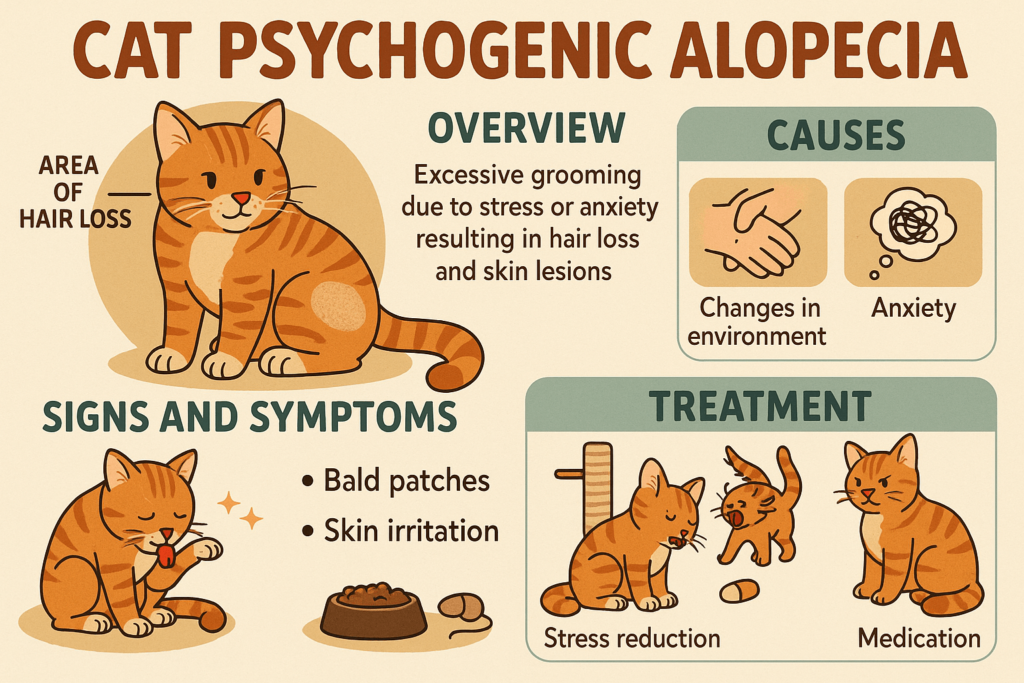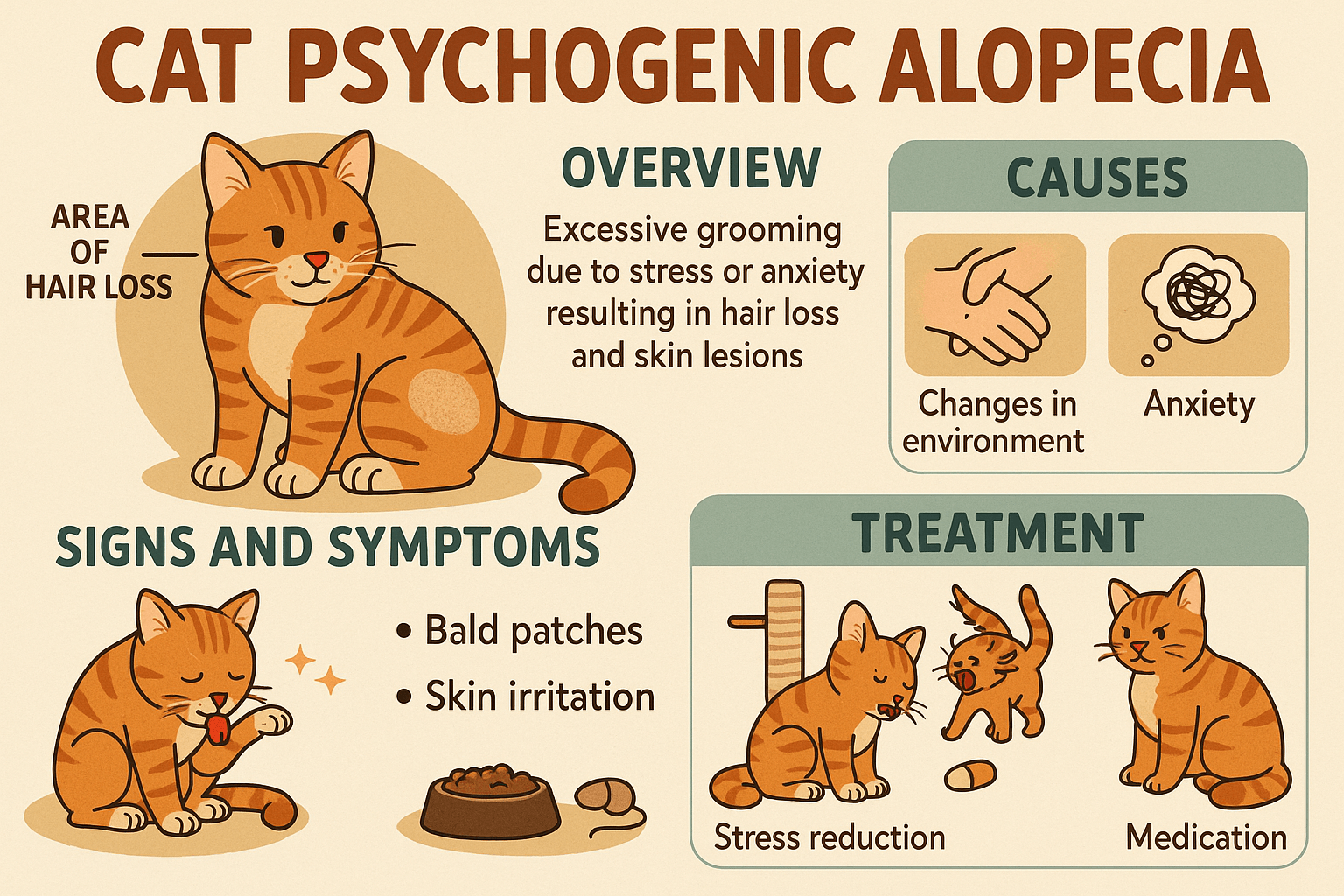Understanding Cat Psychogenic Alopecia: Causes and Solutions
Cat psychogenic alopecia is a condition that affects many feline companions, yet it often goes misunderstood. This behavioral disorder manifests as excessive grooming, leading to hair loss and sometimes even skin irritation. Unlike other forms of alopecia caused by allergies or parasites, psychogenic alopecia stems from stress, anxiety, or compulsive behavior. As a cat owner, recognizing the signs early and addressing the underlying causes can make a significant difference in your pet’s well-being. In this article, we’ll explore what psychogenic alopecia is, how to identify it, and the steps you can take to help your furry friend feel calm and comfortable again.
Expert Opinion on Cat Alopecia
“Cats may develop alopecia due to genetics, underlying health conditions, or stress and anxiety.”
Signs and Symptoms of Cat Psychogenic Alopecia
Identifying psychogenic alopecia in your cat requires careful observation of their behavior and physical appearance. Look out for these key signs that may indicate your cat is struggling with this condition.
Excessive Grooming:
Cats naturally groom themselves, but if your feline spends an abnormal amount of time licking or chewing their fur, it could be a red flag.Patchy Hair Loss:
Bald spots or thinning fur, especially on the abdomen, inner thighs, or legs, are common indicators of psychogenic alopecia.Skin Irritation or Redness:
Over-grooming can lead to irritated skin, which may appear red, inflamed, or scabby in severe cases.Behavioral Changes:
Increased restlessness, pacing, or hiding may accompany excessive grooming, signaling emotional distress.Licking Specific Areas Obsessively:
Cats with psychogenic alopecia often focus on particular body parts, creating uneven patterns of hair loss.
If you notice any of these symptoms, it’s important to address them promptly to prevent further complications and discomfort for your cat.

Common Causes of Cat Psychogenic Alopecia
Psychogenic alopecia is primarily a behavioral issue, often triggered by environmental or emotional factors. Understanding these causes can help you create a calmer environment for your cat.
Stressful Changes in the Home:
Moving houses, introducing new pets, or rearranging furniture can disrupt your cat’s sense of security.Boredom or Lack of Stimulation:
Cats need mental and physical stimulation. A lack of playtime or enrichment can lead to obsessive behaviors like over-grooming.Separation Anxiety:
Cats form strong bonds with their owners, and prolonged absences can cause them to feel anxious or lonely.Territorial Conflicts:
Multi-cat households may experience tension, leading to stress-related behaviors such as excessive grooming.Underlying Health Issues:
While psychogenic alopecia is behavioral, conditions like allergies or pain can exacerbate grooming habits, making diagnosis tricky.
By pinpointing the root cause, you can take targeted steps to alleviate your cat’s stress and improve their quality of life.
Check this guide 👉Cat Losing Hair at Base of Tail: Best 7 Expert Tips!
Check this guide 👉Cat Losing Hair on Belly: Best 7 Expert Tips!
Check this guide 👉Cat Itching and Losing Hair: Best 7 Health Tips!
Prevention Tips for Psychogenic Alopecia | Treatment Options for Affected Cats |
|---|---|
Provide a stable and predictable routine | Consult a veterinarian for diagnosis |
Offer interactive toys and scratching posts | Use calming pheromone diffusers |
Create safe spaces for your cat | Consider anti-anxiety medications |
Introduce changes gradually | Schedule regular playtime and exercise |
Address conflicts between pets | Reward calm behavior with treats |
How to Prevent Cat Psychogenic Alopecia
Preventing psychogenic alopecia starts with creating a nurturing environment that minimizes stress and promotes healthy habits. Here are some actionable tips to keep your cat happy and relaxed.
Establish a Routine:
Cats thrive on consistency. Stick to regular feeding, play, and sleep schedules to provide a sense of stability.Provide Mental Stimulation:
Puzzle feeders, laser pointers, and feather wands can keep your cat entertained and engaged.Create Safe Spaces:
Ensure your cat has quiet areas where they can retreat when feeling overwhelmed or anxious.Introduce New Elements Gradually:
Whether it’s a new pet, furniture, or household member, ease your cat into changes to avoid unnecessary stress.Monitor Interactions Between Pets:
Reduce territorial disputes by providing separate resources, such as food bowls and litter boxes, for each cat.
By implementing these strategies, you can reduce the risk of psychogenic alopecia and foster a peaceful home environment.
Steps to Help Your Cat Recover from Psychogenic Alopecia
If your cat is already experiencing psychogenic alopecia, there are several steps you can take to support their recovery and restore their confidence.
Consult a Veterinarian:
Rule out medical causes and seek professional advice tailored to your cat’s specific needs.Use Calming Products:
Pheromone sprays, collars, or diffusers can help soothe anxious cats and reduce stress-related behaviors.Limit Triggers:
Identify and remove potential stressors, such as loud noises or sudden disruptions, from your cat’s environment.Encourage Play and Exercise:
Regular activity helps redirect your cat’s energy away from compulsive grooming.Reward Positive Behavior:
Reinforce calm and relaxed behavior with treats, praise, or affection to build positive associations.
With patience and persistence, these measures can help your cat overcome psychogenic alopecia and regain their happiness.
How Stress Impacts Your Cat’s Health
Chronic stress can have far-reaching effects on your cat’s physical and mental health. Understanding its impact highlights the importance of addressing psychogenic alopecia and other stress-related issues.
Weakened Immune System:
Prolonged stress compromises your cat’s immune system, making them more susceptible to illnesses.Digestive Problems:
Stress can lead to digestive issues like vomiting, diarrhea, or appetite changes in sensitive cats.Aggressive Behavior:
Some cats respond to stress by becoming aggressive toward other pets or humans.Decreased Activity Levels:
A stressed cat may become lethargic, losing interest in play or exploration.Increased Vocalization:
Cats under stress may meow excessively or display unusual vocal behaviors.
Managing stress is essential not only for preventing alopecia but also for ensuring your cat’s overall health and happiness.
Creating a Stress-Free Environment for Your Cat
A harmonious home environment plays a crucial role in reducing stress and preventing conditions like psychogenic alopecia. Follow these tips to make your space more cat-friendly.
Designate Vertical Spaces:
Install shelves or cat trees to give your cat elevated perches where they can observe their surroundings safely.Maintain Clean Litter Boxes:
Dirty litter boxes can be a source of stress. Scoop daily and replace litter weekly.Minimize Loud Noises:
Keep noise levels low and avoid sudden, startling sounds that might unsettle your cat.Offer Hiding Spots:
Cardboard boxes or cozy beds provide safe havens where your cat can retreat when feeling anxious.Stick to Familiar Scents:
Avoid using strong cleaning products or perfumes that might overwhelm your cat’s sensitive nose.
A stress-free environment supports your cat’s emotional well-being and reduces the likelihood of behavioral problems.
When to Seek Professional Help for Your Cat
While many cases of psychogenic alopecia can be managed at home, some situations require professional intervention. Knowing when to seek help ensures your cat receives the care they need.
Persistent Hair Loss Despite Efforts:
If your cat continues to lose hair despite lifestyle changes, consult a vet to explore further treatment options.Signs of Skin Infection:
Redness, swelling, or open sores warrant immediate veterinary attention to prevent complications.Sudden Behavioral Changes:
Unexplained aggression, withdrawal, or lethargy may indicate deeper issues requiring expert evaluation.Difficulty Eating or Drinking:
Stress-related appetite loss can quickly escalate into serious health concerns if left untreated.Multiple Cats Showing Symptoms:
If multiple cats in your household exhibit similar behaviors, it may signal broader environmental stressors.
Seeking timely professional assistance ensures your cat’s condition is addressed comprehensively and effectively.
Frequently Asked Questions About Cat Psychogenic Alopecia
What is cat psychogenic alopecia?
It’s a behavioral condition characterized by excessive grooming due to stress or anxiety, resulting in hair loss.
Can psychogenic alopecia be cured?
While there’s no definitive “cure,” managing stress and addressing triggers can significantly improve the condition.
Is psychogenic alopecia painful for cats?
The grooming itself isn’t painful, but it can lead to skin irritation or infections, causing discomfort.
How can I tell if my cat’s hair loss is due to stress?
Look for behavioral changes, specific grooming patterns, and consult a vet to rule out medical causes.
Are certain breeds more prone to psychogenic alopecia?
Oriental breeds, such as Siamese cats, are more likely to develop stress-related behaviors, including over-grooming.
Supporting Your Cat Through Psychogenic Alopecia
Cat psychogenic alopecia is a reminder of how deeply our feline friends are affected by their environment and emotional state. By understanding the causes, recognizing the symptoms, and taking proactive steps to address the issue, you can help your cat feel secure and content once again. Remember, patience and empathy are key—your love and care will go a long way in restoring your cat’s well-being. With the right approach, you can strengthen your bond and ensure your cat lives a happy, stress-free life.
Canned Pumpkin for Cat Diarrhea: Best 7 Expert Tips! Natural remedy to firm stools, soothe upset bellies, and support gut health safely.
Can a Cat Give You Scabies? Best 7 Expert Tips! Discover the truth about feline mites, human skin risks, and how to protect yourself—without panic.
Cat Flea vs Human Flea: Best 7 Expert Tips! Discover the truth about bites, species, and how to eliminate infestations for good.
Weird Cat Behaviors: Best 7 Expert Tips! Discover why cats do strange things—and how to understand, not punish, their instincts for a happier home.





